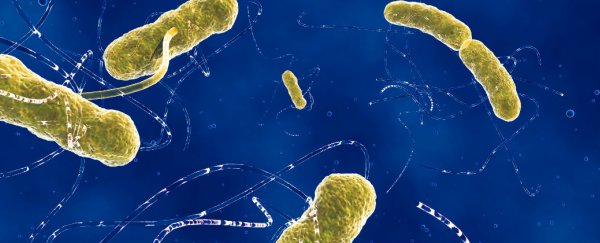We know that the complex colonies of microbes that live in our guts affect our physical health - imagine trying to digest things without them - but new research now suggests that they also have a positive influence on the way we think.
Previous studies have revealed that in mice, changes in gut microbe colonies appear to ease feelings of anxiousness, and can help control the levels of cortisol - a potent stress hormone - coursing through the body.
And now a new study on humans by researchers in the UK suggests a positive link between our gut microbes and our mental health. By feeding volunteers packages of gut-friendly prebiotics - non-digestible carbohydrates that act as food for 'good bacteria' called probiotics - the team was able to change the way they process emotional information, making it easier for them to ward off anxious or depressed feelings.
Led by Philip Burnet from the University of Oxford's Department of Psychiatry, the team worked with 45 heathy people aged between 18 and 45. Split into two groups, half of them took a daily prebiotic supplement, and half a daily placebo, over a three-week period. Once that stage was up, the volunteers were asked to complete several computer-based activities that tested their ability to process emotional information. For example, one of these activities involved having to process positive and negative words.
As Rachael Rettner explains at LiveScience, the prebiotics appeared to be having some effect on the way the volunteers responded to stimuli in the tests:
"During one computer test, people who took the prebiotic paid less attention to negative information, and more attention to positive information, compared with people who took a placebo. A similar effect has been seen in people who take drugs for depression or anxiety, and the finding suggests that the people in the prebiotic group had 'less anxiety about negative or threatening stimuli,' Burnet said."
This could be because the people who took the prebiotics were also found to have lower levels of cortisol in their saliva. According to Burnet, people who experience higher than average cortisol levels are more likely to experience feelings of stress, anxiety and depression. The team published their results in the journal Psychopharmacology.
One thing to keep in mind is that the study was partly funded by prebiotic manufacturer, Clasado Research Services, but the results seem to reflect those from previous, unrelated studies.
Rettner mentions a 2011 study conducted in France that had people taking probiotics for 30 days straight, and afterwards, their levels of psychological distress were measured and found to have been reduced from where they were at the beginning of the study.
Then in 2013, researchers at the University of California, Los Angeles, in the US gave their women volunteers milk with either probiotics, or no probiotics added, for a period of four weeks. The women were then asked to look at pictures of people making angry and fearful facial expressions while their brain activity was monitored. Rettner reports that those on the probiotic milk diet showed less brain activity in the regions of the brain responsible for processing emotions than the non-probiotic group, suggesting that they found the exercise easier to deal with.
Perhaps, Burnet told LiveScience, the possible link between healthy colonies of good bacteria in the gut and robust mental health could have to do with the fact that these bacteria are also linked to the immune system. It could be that a healthy immune system influences the brain to be less anxious and depressed, he said, but further research needs to be done to further establish the link.
While it's much too soon to start demanding perfectly packaged, mood-altering prebiotic supplements be made available to solve all of our emotional woes, studies like this are an important step towards figuring out exactly wtf is going on inside our guts.
For an organ that is intrinsic to our overall health, we still know very little about how the stomach responds to different stimuli, whether it's something we consume, or events that affect our gut bacteria. But what we do know is that we're basically just walking bacteria farms, so it makes sense that they'd be having some effect - directly or indirectly - on our moods, and with more research, perhaps we can alter these colonies as a new kind of treatment for disorders related to anxiety and depression.
Source: LiveScience
